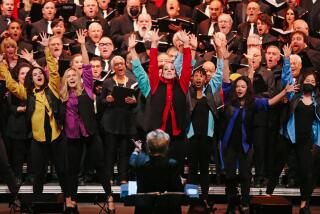MUSIC REVIEW : Sophisticated Westminster Choir Sounds at Home on Its Range
- Share via
FULLERTON — In the midst of a whirlwind tour of five western states, the Westminster Choir flexed its muscles Saturday night at Fullerton Evangelical Free Church in a concert that ranged from Renaissance a capella works to 20th-Century oratorio; from the refinement of Schubert to the nitty-gritty of spirituals.
Offering something for everyone, the 40-voice group from Westminster Choir College--the elite core of the Princeton, N. J., school’s 160-member Symphonic Choir--represented the college with ambassadorial flair.
Appearing under the auspices of the North Orange County Community Concert Assn., the chorus established the breadth of its expertise immediately with three unaccompanied Ave Maria settings. In Tomas Luis de Victoria’s modest gem, conductor Joseph Flummerfelt drew clear, unforced lines from the choir. Stravinsky’s simple setting elicited flowing declamation, while Verdi’s quietly piercing dissonances unfolded with controlled ease marked by expressive attention to text accentuation.
As an ensemble, the choir exhibited an admirably homogeneous blend (although on their own--as in Mendelssohn’s “Der Gluckliche”--sopranos wobbled lightly). In Randall Thompson’s “The Last Words of David,” the composer’s sustained homophonic lines particularly underscored balanced coordination that remained unshaken despite strenuous demands on breath control.
Flummerfelt requires self-reliant control from his group, eschewing the use of microphones even in symphonically proportioned works. Accordingly, following a nervous introduction by soprano Kristine Hurst, the final chorus from Honegger’s “King David,” grew from floating transparency to a surprisingly weighty density. Accompanist Glenn Parker contributed flamboyantly to the effect.
Although more than half the choir members are voice majors, Saturday’s program placed little emphasis on solo abilities. Of the 25 selections, only three permitted one person to usurp the limelight from the group, even briefly. Among those moments, tenor David Monseur’s focused, earthy leadership in the spiritual “If I Got My Ticket” shone brightly.
Vocal studies were certainly evident nevertheless, especially in Handel’s “Let Us Break Their Bonds Asunder,” from “Messiah.” Here, polyphonic filigree that yearly confounds scores of amateur choirs, emerged with tight control, clear enunciation, and crisp rhythm.
Vocal training requirements for foreign language and diction studies also revealed themselves in pronunciation of Italian and German, both of which were made to serve through clarity and appropriate emphasis. Yet ease with several languages is expected, given the extent of professional-quality experience of which the chorus can boast:
This season alone, as a part of the 160-member Symphonic Choir, the group has collaborated with the New York Philharmonic, under Mehta, and with the Philadelphia Orchestra, under Muti. They are, moreover, the chorus-in-residence at Spoleto.
More to Read
The biggest entertainment stories
Get our big stories about Hollywood, film, television, music, arts, culture and more right in your inbox as soon as they publish.
You may occasionally receive promotional content from the Los Angeles Times.










